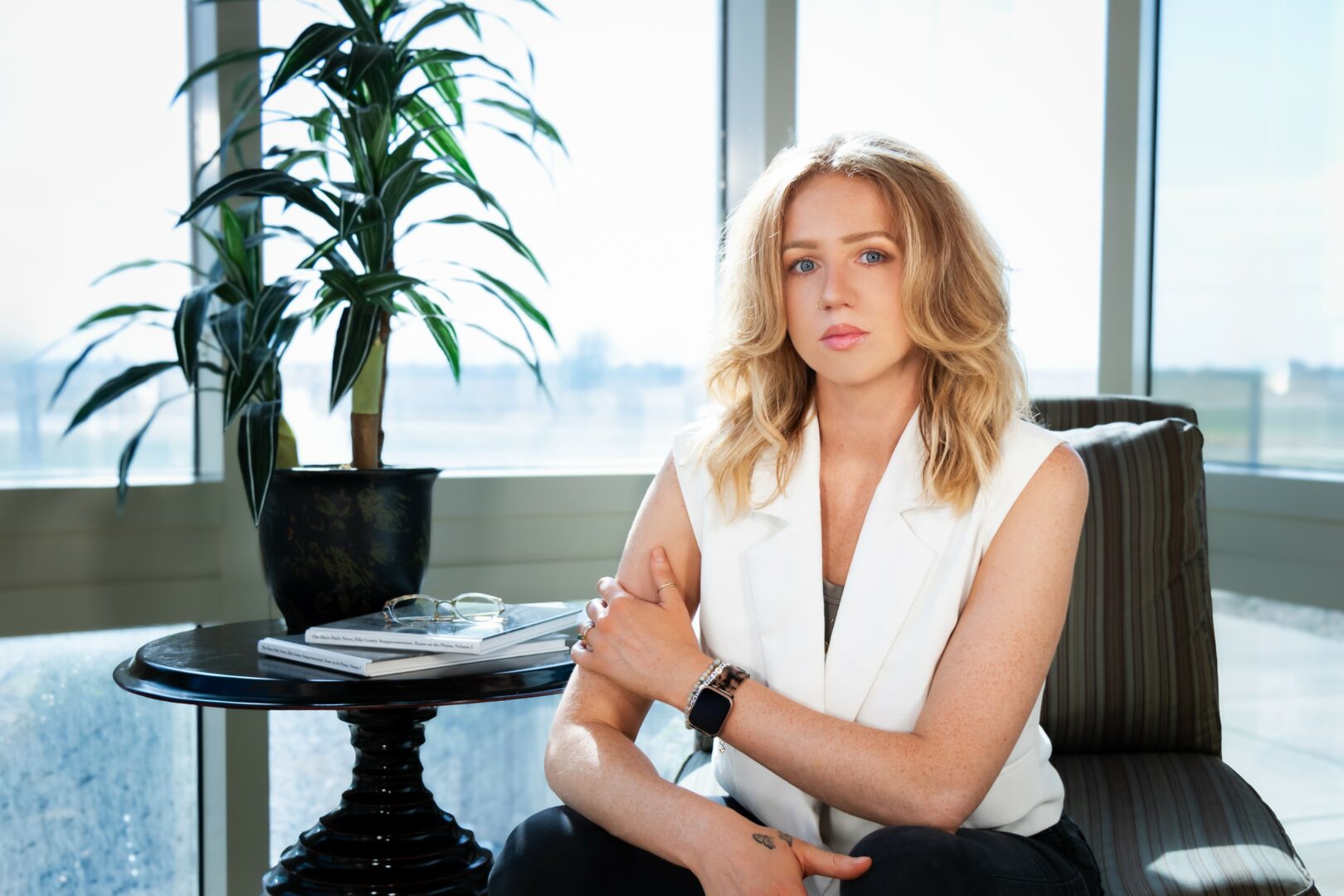Alright – so today we’ve got the honor of introducing you to Colleen Vandenberg. We think you’ll enjoy our conversation, we’ve shared it below.
Colleen, thank you so much for making time for us today. We can’t wait to dive into your story and the lessons you’ve learned along the way, but maybe we can start with something foundational to your success. How have you gone about developing your ability to communicate effectively?
I have always loved to read, flip through magazines and photo books, and watch films. In doing so, I picked up on different strategies of crafting narratives through osmosis. However, as I moved through my degree programs as a student, and now as a professional artist, the Elements and Principles of Design are the foundation of my storytelling and visual communication style. Elements like point, line, shape, color, and texture take on metaphorical meaning and craft engaging narratives when used intentionally. For instance, vertical lines represent strength and power, whereas horizontal lines give a sense of balance. Warm, saturated colors lend themselves to a sense of passion and energy, whereas desaturated colors provide a sense of fading energy. Rough textures lean towards harshness, where smooth textures lean towards a feeling of ease. Everything in my frame has a purpose that is guided by these elements. Everything in my frame is a symbol meant to be interpreted by the audience.

Thanks, so before we move on maybe you can share a bit more about yourself?
My name is Colleen Vandenberg, and I am an interdisciplinary artist and educator. I hold an MFA in Interdisciplinary Art & Media and a BA in Professional Photography. I am an adjunct instructor in the Digital Photography degree program at SNHU, and produce experimental films and photo books. I also create short documentaries for nonprofits serving children with special needs and social justice issues. Additionally, I am the lead art instructor and serve on the board of The Yet Mindset, which is a Northern Illinois-based nonprofit that provides professional development and in-class social/emotional learning activities to public schools and private clients. I also provide virtual and in-person art classes to children, teens, and adults available at https://www.colleenvandenberg.com/classes
I believe an innovative approach to learning that uses many modalities creates discovery, awareness, and critical change within an individual. These are the core ideas that guide my work as an educator. My goal is to foster transformative learning whenever possible, meaning that students leave my courses with an enhanced perspective on the subject we are studying, as well as a deeper awareness of ourselves and the world around us. This is achieved through open and respectful lines of communication, encouragement, flexibility, sensitivity towards each student’s circumstances, and constructive criticism that nurtures each student’s creative voice and skill set.
Earlier in my career, I taught photography and visual art in a variety of venues, including art leagues, underserved schools on Chicago’s South Side, and community colleges. During that time, my husband and I opened a gallery space, where we worked with commercial clients, independent filmmakers, community groups, college students, and international artists.
My most recent short experimental film was an official selection of the 2023 Brooklyn Film Festival. My most recent short documentary profiled a child with an extremely rare genetic disorder, and helped raise over $35k for his family. A notable previous client of mine was the Illinois Hunger Coalition. I produced a public service announcement for Pandemic-EBT that aired on various platforms, including television. P-EBT was a federal program that provided families with financial assistance to provide meals for their children when school was remote during the early stages of the pandemic.
YOUR TURN is my first photo book, and unlocks richer meaning in images by engaging you, the viewer, as a collaborator. By asking you to title each image in the book, it presents the opportunity to connect with (and extract) the latent stories crafted not only by my photography, but by your own unique projections. Your interpretation of each image is equally as valuable as my intention.
Inspired by Roland Barthes’ essay, “The Death of the Author”, YOUR TURN explores and challenges the boundaries of where one artist’s work ends, and the new artist’s work begins.
The images were created via the following methods and means: a homemade camera obscura, digital photography, a pinhole camera, instant film, and photograms developed in my darkroom using caffenol and/or beer-based developer and salt fix
My Instagram profile is where I share most of my photography and films: https://www.instagram.com/c.0.l.l.e.e.n/

There is so much advice out there about all the different skills and qualities folks need to develop in order to succeed in today’s highly competitive environment and often it can feel overwhelming. So, if we had to break it down to just the three that matter most, which three skills or qualities would you focus on?
Here are three qualities that have impacted my journey:
I have a willingness to experiment and fail until I succeed.
I learned “the rules” of my craft in order to break them. I pushed through the technical lessons of manual exposure and film development/printing/darkroom so that I have a firm grasp on all the ways I can strengthen my visual story.
I love and believe in my own work, even when no one cares or no one understands it. That is my key to sustaining a lifelong practice.
Here is some advice for those who are just starting out:
Have a day job that you really love and can sustain you monetarily.
Establish a community of fellow artists that you trust, admire, and have different skill sets/strengths than you that you can workshop your artwork with. Find peers who will give you sincere, well-rounded critiques of your work, ask important questions about your process, and that you can offer to them in return. Do not surround yourself with yes people. Instead, surround yourself with people who appreciate your process but will challenge you in ways that expand your view and help your skills grow. Praise alone leads to less discovery and growth. One of my favorite professors told me this: If we look at our art as a box in the middle of the room, completely detached from the maker… just a box that we are meant to observe… we can truly evaluate the strengths and the weaknesses of the box. Even the maker of the box can see it objectively. That is when we break through barriers. We remove the personal connection and the ego from the artwork and see it as an object with characteristics. If the box isn’t sturdy, we can talk about how to fix it. If the box is innovative in some way, we can dive into that.
Have realistic expectations. When you expect too much too fast, it can impact your ability to try, fail, discover, and break through barriers. Think of learning a new skill as learning a foreign language, which takes immersion, time, and practice to become fluent. As an art professor, I often give this analogy and ask students to liken learning a new skill to taking French 101, or any other language that they do not speak. Remind yourself that you would not expect to leave an 8-week French course being fluent or communicating everything and anything you want to say. However, you can expect to be conversational, communicate the basics, and have a fantastic foundation to keep building upon. Keep that in mind when you set your expectations. You are building the foundation and learning the basics of that skill. It takes years to be fluent. When you frame the experience like that, the burden you put on yourself is lifted and the path to discovery becomes wider and more fun! This can apply to so many experiences in life within and outside of the classroom. Whenever we learn something new, whether it is a sport, computer program, or something as significant as becoming a parent, the most productive and nurturing expectation we should hold ourselves to is that everything takes immersion and time to become fluent.

As we end our chat, is there a book you can leave people with that’s been meaningful to you and your development?
Sally Mann | At Twelve. Here is a quote from the publisher regarding the content of the book:
“At Twelve is Sally Mann’s illuminating, collective portrait of twelve-year-old girls, taken in the artist’s native Rockbridge County, Virginia. The age of twelve brings tremendous excitement and social possibilities; it is a trying time as well, caught between childhood and adulthood, when the difference is not entirely understood. As Ann Beattie writes in her perceptive introduction maintained from the 1988 original publication, “These girls still exist in an innocent world in which a pose is only a pose—what adults make of that pose may be the issue.” The consequences of this misunderstanding can be real: destitution, abuse, unwanted pregnancy. Within this book of portraits, many of which are accompanied by writings of the artist, the young women in Mann’s unflinching large-format photographs, however, are not victims. They return the viewer’s gaze with a disturbing equanimity.”
This paragraph above is a direct quote text from the publisher, and can be found here: https://aperture.org/books/at-twelve-portraits-of-young-women/
It reinforces that you do not need a huge budget or crew or equipment to tell a truly moving, important, and engaging story as I, myself, often work alone without an assistant on location or at home.
This series is a testament to the power of eye contact, cultural symbolism, shooting what you know, the beauty and power of the shared feminine experience of coming of age, and the balance between finding a scene versus creating a scene.
Contact Info:
- Website: https://www.colleenvandenberg.com/
- Instagram: https://www.instagram.com/c.0.l.l.e.e.n/




Image Credits
All images are ©Colleen Vandenberg
so if you or someone you know deserves recognition please let us know here.




